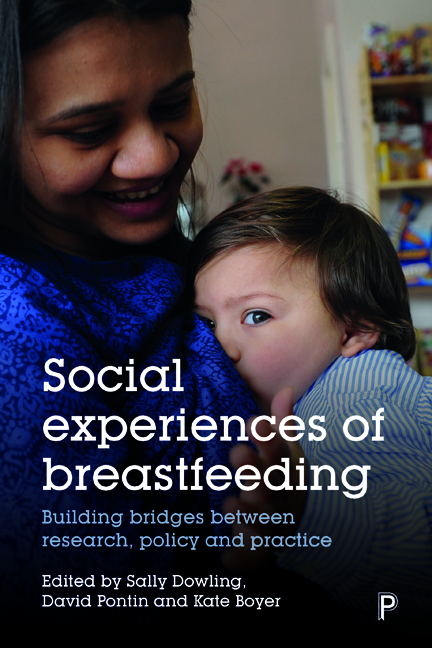Book contents
- Frontmatter
- Dedication
- Contents
- List of tables and figures
- Notes on contributors
- Acknowledgements
- Introduction
- The UK policy context: reconfiguration of the Unicef UK Baby Friendly Initiative to reflect the importance of relationships and ensuring sustainability
- Part I Breastfeeding and emotions
- Part II Cultures of breastfeeding
- Part III Breastfeeding and popular culture
- Conclusion
- Appendix: Schedule for ESRC Seminar Series: Social Experiences of Breastfeeding: Building bridges between research and policy, 2015–16
- Index
Series context: reflection on experiences of attending the seminar series
Published online by Cambridge University Press: 22 April 2022
- Frontmatter
- Dedication
- Contents
- List of tables and figures
- Notes on contributors
- Acknowledgements
- Introduction
- The UK policy context: reconfiguration of the Unicef UK Baby Friendly Initiative to reflect the importance of relationships and ensuring sustainability
- Part I Breastfeeding and emotions
- Part II Cultures of breastfeeding
- Part III Breastfeeding and popular culture
- Conclusion
- Appendix: Schedule for ESRC Seminar Series: Social Experiences of Breastfeeding: Building bridges between research and policy, 2015–16
- Index
Summary
Attending the seminar series was a unique experience in which a range of participants from the fields of academia, practice and policy were brought together with the intention of creating the opportunity for ‘collaborative knowledge creation’. I was interested to explore the extent to which the vehicle of the seminar series fulfilled this ambition and how the seminars were experienced by the range of attendees. In this short chapter I will share what I have discovered.
First, let's consider why bringing people together from different perspectives might be worthwhile. What do we imagine the value of collaborative knowledge creation would be? Since the early 1990s, an evidence-based medical approach to healthcare provision has been advocating for the greater use of research in clinical practice (De Brun, 2013). Evidence-based practice is seen as a marker of good-quality, effective health services, and is increasingly valued in the voluntary world too (Breastfeeding Network, 2016; NCT, 2017).
Alongside this, there has been a parallel move towards evidence-based policy (Parliament UK, 2011) which supports giving significant weight to research evidence as policies are shaped. In addition, academics who carry out this research are increasingly aware of the importance of being able to demonstrate ‘user value’, and the impact of research on the economy and society, which in the UK is reported via the Research Excellence Framework (Research Excellence Framework, 2014). However, embedding research into practice and policy in a meaningful way presents many challenges. As practitioners the evidence about the things that challenge us is not necessarily available to us and it sometimes seems that nobody is studying the things we have questions about. Policy makers are not always aware of the research that could inform policy. Researchers don't always understand what practitioners or policy makers struggle with, or do not have funding to study these areas. Buse et al (2005) use the concept of two communities (university researchers and government officials) to describe this set of challenges. This seminar series started from the premise of three communities: academics, policy makers and practitioners. There appears to be a consensus that there is a need for more dialogue and closer working.
- Type
- Chapter
- Information
- Social Experiences of BreastfeedingBuilding Bridges between Research, Policy and Practice, pp. 245 - 250Publisher: Bristol University PressPrint publication year: 2018

